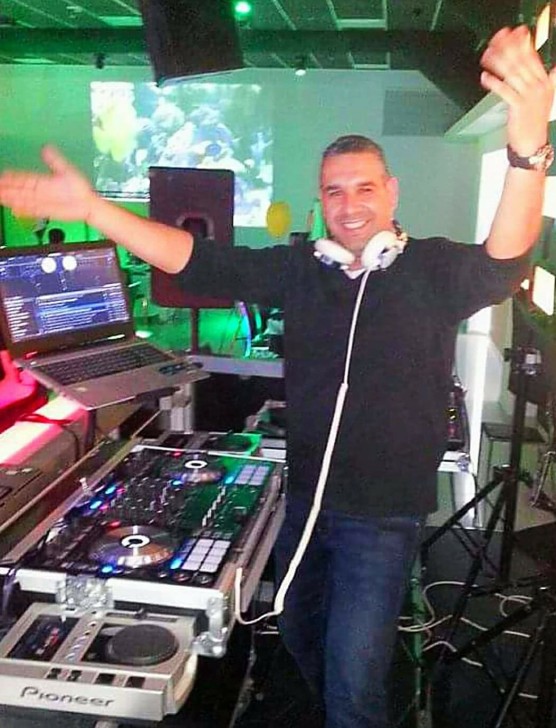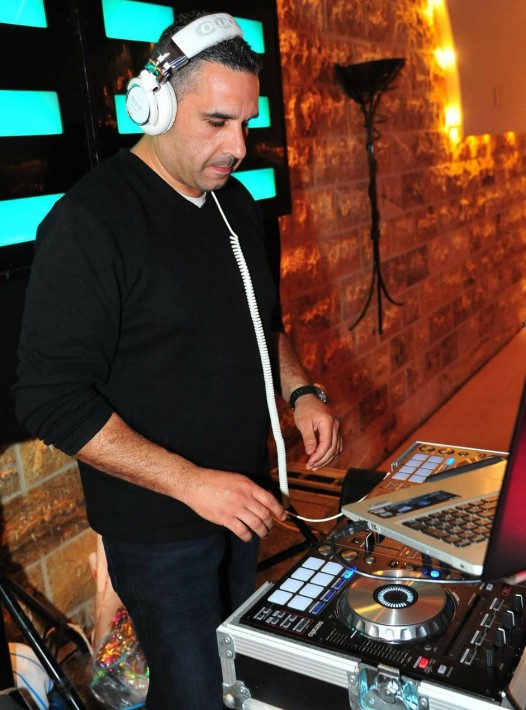Personal Stories
From Top DJ to Shabbat Observer: Zafrir Shukrun’s Powerful Journey of Faith
How a successful Israeli DJ gave up weekend gigs, transformed his family life, and embraced a life of Torah, separation, and spiritual growth

The moment when the decision settled in his heart that he would never perform on Shabbat again, no matter what, is remembered by Zafrir Shukrun as one of the most ambivalent moments of his life. On the one hand, the decision was clear inside him and he felt at peace with himself; on the other hand, the reactions around him made him wish the earth would open its mouth and swallow him.
Until then, he had been a successful DJ who played in almost all the top clubs across the country, getting people dancing the way only an experienced DJ knows how. A significant part of his gigs took place on Shabbat, and he was regularly booked for many events. After he made the decision to stop performing on Shabbat, the reactions he heard were full of surprise.
“I got a lot of positive feedback, but there were also condescending comments,” he says. “Some people were very supportive, and others tried to talk me down from ‘the tree’ and explain what a stupid thing I was doing. Honestly, the belittling comments were the hardest for me. But I have to emphasize that today I am completely at peace with myself, and I really don’t care what people around me think.”
Wanting to Come Closer
Zafrir Shukrun was born in Tzfat and grew up in Kiryat Shmona, but he DJs all over the country. For as long as he can remember, he has been involved in music, and right after he finished his army service, he began working as a DJ in clubs. In his younger years, he worked as an employee, and since 1997 he’s been working as an independent DJ at celebrations and events.
A number of years ago, a huge change took place in his life when he decided to strengthen his observance and do teshuva (return to religious life). Since then, his life has turned around 180 degrees.
How does it happen that one bright morning a person simply gets up and decides to become religious?
“This process happened in two stages for me,” Zafrir explains. “The first time was quite a few years ago, when I started to strengthen and draw closer to Judaism — out of love, out of curiosity. It wasn’t strange at all, because ever since I was a child, I loved tradition and always felt connected to my religious relatives.
“I remember the first Shabbat I ever kept — it was really not easy. I was sure every minute that I was about to fail… My phone kept ringing all Shabbat long, and it was very hard for me not to answer. In the end, I managed and I held strong. I was happy — but the problem was that the more I came closer, the more my wife pulled away. It bothered her, and she had a hard time accepting the changes in me.
“In the end, I stopped my process of getting closer — for the sake of our shalom bayit (marital peace). Even though I longed to do teshuva at 100%, I still remained pretty far. A few years went by, and about three years ago a shift happened that proved that the patience had paid off. It was before the birth of our youngest son, when the unbelievable happened: my wife decided that she wanted to strengthen herself and start keeping mitzvot.”
How did you feel about that?
“It was an enormous joy, but at the same time I was very afraid of being disappointed. I told my wife that I was scared to draw close again, to be all ‘on fire,’ and then suddenly discover that she wasn’t serious enough. I told her straight out that at this stage I wasn’t taking any steps forward until I saw that she was taking this all the way.”
And how did it end up?
“My wife understood me, she let me sit on the sidelines while she moved forward in giant steps. Each time she added more and more commitments about modesty, Shabbat observance, kashrut… In the end, I couldn’t just keep sitting and doing nothing — I got swept along with her.”
Not Working on Shabbat
The next stage was already clear to Zafrir — he knew exactly what he had to do.
“I came to the conclusion that I was going to keep Shabbat fully, and if you keep Shabbat, then obviously you can’t perform. That was a huge sacrifice for me, because until then Shabbat was the day I performed the most. I would be invited to parties in kibbutzim and different clubs. It meant giving up a significant part of my income.
“But from the moment I made the decision, I knew I was going to stick to it. And to anyone who called to book me for a Shabbat gig, I answered with these words: ‘I’ve finished working on Shabbat. If you want, I’ll gladly do it on another day.’ They were stunned. Some of the people who contacted me were organizations that had been hiring me regularly, sometimes for nearly ten years. It was very strange for them.”
Along with the changes in his work, Zafrir also began changing his entire family lifestyle.
“We started living in a completely different way from how we had lived before. We faced many challenges, but we also had tremendous love and satisfaction — and, most of all, a huge desire to keep learning and growing. To this day, we continue to learn and take on new things.”
I’m sure not everything was simple. Can you share something difficult you’ve faced along the way?
“Nothing was easy — that’s for sure. Even today, it’s hard for me that my oldest son, who is 14, isn’t yet studying in religious frameworks. On the other hand, my youngest, who is three, already goes to a boys-only kindergarten and will continue in a charedi (ultra-Orthodox) education. He doesn’t know anything else. To hear him say the blessing for washing hands and praying — it makes my heart melt.
“Every time, my wife and I talk and say that if only we could turn back the clock and be born into holiness, we would be so happy… Of course, I personally have ups and downs too. On days when I feel I’ve fallen, I tell myself that I’m taking two steps back in order to move five steps forward. My ambitions are very high — I know exactly where I want to get to.”

Only Separate Dancing
Very soon, Zafrir realized that he wasn’t willing to stop just at not performing on Shabbat. He wanted to go further and perform only at events with separate seating/dancing for men and women. This was a dramatic decision, because most of the events he had been booked for until then were not separate at all.
So what, you just stopped doing mixed dancing events from one day to the next?
“From the moment I decided to stop performing at mixed events until it actually happened, seven months went by. I couldn’t stop immediately, because unfortunately, I had contracts I’d already signed and I had to keep them. I didn’t feel comfortable performing at mixed events, but I had no choice, because I try to give 100% to every client.
“I had to create a very strong emotional disconnection at those events. The last mixed event I played at was for a close friend. I remember how emotional I was when the event ended and I knew that from that moment on, I was going to work only in holiness. Thank G-d, I’ve kept that decision without any deviations. True, there are fewer bookings now than in the past — but I know that parnassa (livelihood) comes from Heaven, and the effort I want to make is in a pure way, not in a way that involves prohibition.”
You also must have had to adjust your playlists and content for the events. Does that mean you had to learn everything from scratch?
“Yes and no,” he answers. “Obviously I had to get to know in depth how separate events work, because they’re different from mixed ones. At separate events there are usually divrei Torah (talks), a siyum on a tractate, and more. It’s not just music.
“Also, the songs at religious events are different, and there are lots of Chassidic songs. But it wasn’t hard for me to learn the ‘codes,’ mainly because in the past, even when I did mixed dancing, I occasionally played at separate events — so I knew the scene.
“On top of that, I really believe that exactly because of my past, I can bring a higher level to the religious public — something they’re not used to. I take all the skills I had in the past, as a DJ and also as a senior broadcaster on Kol Yisrael radio, and bring them now in holiness and fully adapted to the needs of the religious public. People who book me enjoy discovering new rhythms and a special, more interesting style than what they’ve known until now.”

There was a lot of talk about the singer Motty Steinmetz, who refused to perform in front of a mixed audience. How did you feel when you heard about that?
“I mostly felt identification. I understand him so, so well and I know why this is important to him. I wish I could encourage him and strengthen his hands. It’s clear to me that as music people, we must not compromise in any way and perform in front of a mixed crowd, even though the tests are hard — and who knows this better than me?”
You say the tests are hard. What gives you strength in those moments?
“My wife,” he answers immediately. “She’s the one who gives me strength. When I see how strong she is, how she makes sure to go to classes and listen to lectures and talks — that strengthens me too.
“On days when I feel weaker, she’s the one who encourages me. When I tell her, for example, ‘I’m tired, I’ll go to Mincha later,’ she reminds me that it’s not a good idea to postpone, because if you postpone, it usually doesn’t happen in the end.
“We’re going through this process together, we strengthen each other, and we believe that thanks to our mutual desire, we’ll merit to reach higher and higher.”

